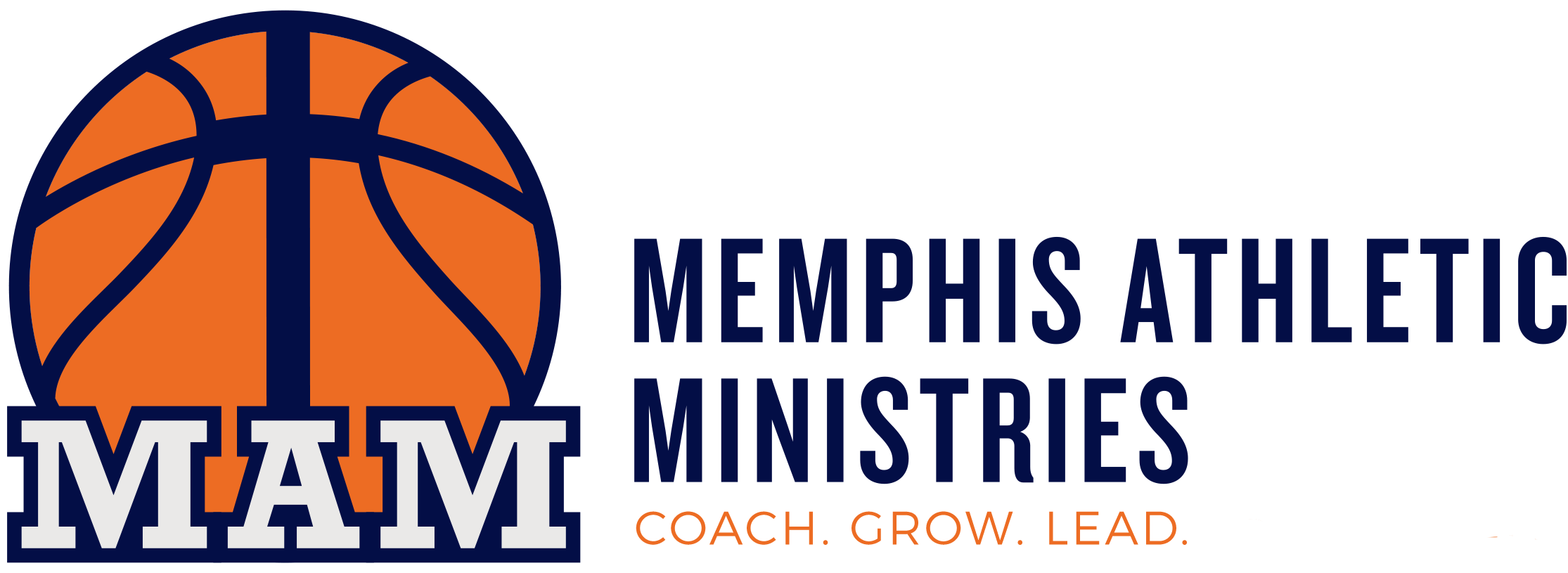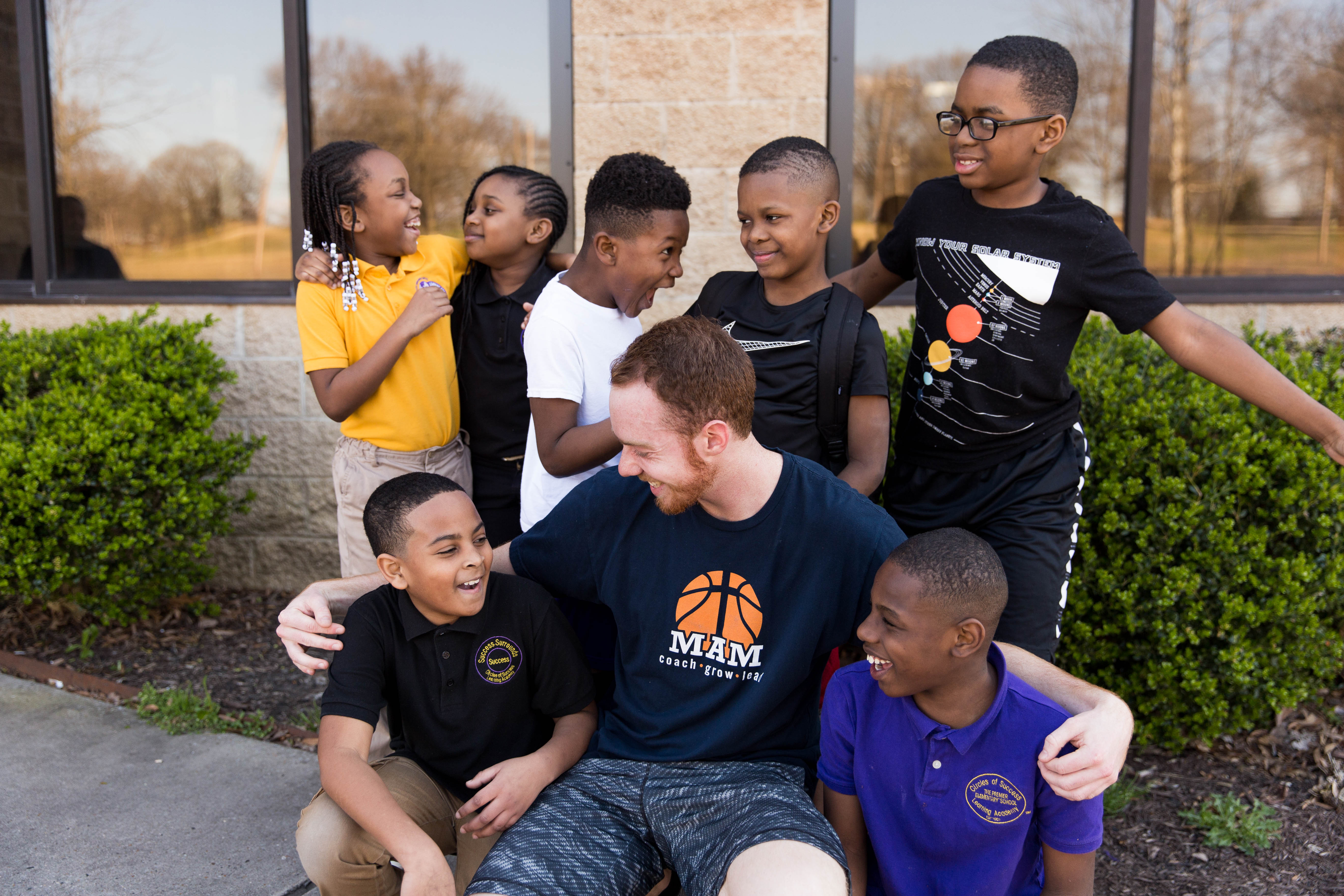Written by David Waters
The real aim of MAM isn’t to teach basketball to the 700 kids who show up every day. It is to build community and strengthen families by demonstrating God’s love.
When local basketball legend Anfernee “Penny” Hardaway showed up at the Memphis Athletic Ministries annual Christmas Classic youth basketball tournament last December, the reception from the 90 participating teams was more than reverent. It was ecstatic.
“The kids went crazy like a rock star entered the building,” said Randy Odom, the president and CEO of Memphis Athletic Ministries, or MAM. “Those kids not only know who he is. They know where he came from and how he came up.”
Hardaway, who became an All-American at the University of Memphis and an NBA All-Star, came up in one of the poorest neighborhoods in Memphis — one of the poorest big cities in the country.
Four in 10 Memphis children are living in poverty. Six in 10 live with an unmarried parent. Two in 10 of the city’s youth ages 16-24 are out of school and chronically unemployed — the highest rate of “opportunity youth” in the country.
Those are the youth Odom and his MAM coach-mentors work with every day, hundreds of them at seven locations around the city. It’s one of the largest youth sports programs in the city, but it’s more than a place to play basketball after school or in the summer.

“I love their commitment to kids and to neighborhoods,” said the Rev. Eli Morris, the senior associate pastor at Hope Presbyterian Church, one of the city’s largest congregations. “In a basketball-crazy city, they have leveraged that love of the game for the good of our young citizens, providing them with an effective spiritual, social and physical outlet.”
Beyond the sports, MAM provides a literacy program, a summer academy, career readiness training, and community service opportunities, in addition to daily devotions and Bible studies. Its offerings are free or low-cost to families; the $3.9 million annual budget is funded by individuals, private grants and churches.
Beyond being a conduit for programs or services, is your ministry incarnational?
But its leaders see MAM as more than just another faith-based organization. They want it to be more than recreational and educational. They want it to be incarnational.
“We tell our coach-mentors, ‘Don’t just talk about Jesus. Be Jesus in the flesh,’” Odom said. “I want every child who walks through our doors to know they are seen and heard and loved and valued.”
Barbecue, the blues and basketball
The story of Memphis Athletic Ministries begins with Larry Lloyd, a Memphis native and Presbyterian minister who sort of became the “Johnny Mustard Seed” of Memphis.
Lloyd and others started one of the first Young Life chapters in 1975, as well as what is now the state’s largest Christian social agency. In 1987, he used a $10,000 seed grant from World Vision to launch the Memphis Leadership Foundation.
The foundation’s mission is “not only to proclaim the gospel but to put that same gospel to work by building communities, strengthening families,” Lloyd said.
“Our mission is to lead Memphis youth by helping them discover their identity in Christ and purpose in their community, to have hope restored, and to have a changed life,” he said.
Lloyd discussed the need with several other men, including Kelvin Bowen. Bowen was an assistant at a popular recreation program at a Memphis church that served as an inspiration for MAM, and now serves as the coordinator for referees for MAM.
When Bowen was a teenager, he’d walk a couple of miles from his tough neighborhood to the church to play basketball. He wanted to give kids who grew up as he did the same opportunity.
“Without those Christian coaches to guide me in my growing-up years, I probably would have gotten involved with gang violence,” Bowen said. “Instead, I went to college and received my bachelor’s degree. I credit that program for saving my life.”

The Memphis Leadership Foundation launched Memphis Athletic Ministries in 1998. From the beginning, MAM hoped to recreate Bowen’s experience of strong Christian mentoring through sports.
“As we began to visualize MAM, it wasn’t lost on us that basketball is the major lifeblood of this city,” said Gib Vestal, a former investment banker who served as MAM executive director from 2001 to 2014 and is retired from its board.
Memphis is crazy for barbecue, the blues and basketball. In a city often challenged by racial issues of black and white, nearly everyone bleeds blue — Tiger blue for the University of Memphis men’s team or Grizzly blue for the city’s NBA team. Local news organizations have more reporters covering the city’s two basketball teams than all of its schools.
“We believed that sports, especially basketball, would be the means to attract youth into our gyms so that we could share and model Jesus Christ,” Vestal said.
What in your context might attract young people so you can “share and model Jesus Christ”?
Modeling is the key, said Lloyd. MAM staff members are trained to be “incarnational leaders” by building relationships of grace and trust.
“Not set up rules, not demanding trust, but entering their world, walking with them, having lunch with them, building relational capital, just as Jesus did with his disciples or with Mary and Martha or Zacchaeus,” Lloyd said.
“It comes from the incarnation, where the Gospel writer John says that the Word became flesh and tabernacled among us,” he continued. “Eugene Peterson [in The Message] says it this way: ‘The Word became flesh … and moved into the neighborhood.’”
A day at the Grizzlies Center
MAM has moved into the neighborhoods of Memphis.
Operating six days a week, Monday through Saturday, it serves nearly 700 kids from 60 to 70 public schools at seven locations, including three community centers, two churches, a public school and the Grizzlies Athletic Center — a state-of-the-art sports and recreation complex that includes a nine-hole golf course — built with a $1 million donation from the Memphis Grizzlies Foundation.
The afterschool programs are free; the eight-week summer academy costs $50 per child, and tournaments, such as MAM’s signature Christmas Classic, cost $200 per team.
Literacy Mid-South and the Grizzlies are among MAM’s many partners. Where could you look for ministry partners, and how could you sustain those relationships?
The Grizzlies Center sits in a declining south Memphis neighborhood between a massive old industrial park and Memphis International Airport.
Every weekday from 3:30 p.m. to 8:30 p.m., dozens of elementary, middle and high school students start walking up or spilling off school buses and streaming into the gym, a video game room and a lounge.
“Elementary and middle school boys, meet me on the field in 20 minutes!” Daniel Thompson shouts above the din.
This is Thompson’s first year as a coach. He’s majoring in sports marketing at the University of Memphis — and minoring in mentoring at MAM. Thompson grew up in a middle-class military family with two parents.
“I am a military kid, so we moved around a lot,” he said. “Sports was always a way for me to connect wherever we went. That’s what I want to give these kids.”
Thompson and other coaches and mentors separate the students into teams of 10-15 based on their gender, grade or reading level, depending on the activity that’s ahead.
The kids practice their sports skills (dribbling, passing, shooting) and life skills (perseverance, grit, integrity, teamwork) on one of two full-size basketball courts.
They get help with their homework and their reading, vocabulary and comprehension skills.

They compete in vocabulary contests with words such as “discover,” “inquiring” and “remarkable,” as well as “aggression,” “rude” and “worry.” In one room, it’s the Wakandans vs. the Dora Milaje.
“They’ve been in school all day, so the challenge is to make reading fun,” said Caroline Berry, a college student who has been coaching for three years. “And to keep them focused.”
How could you integrate learning into youth activities that are genuinely fun?
Students eat a snack or dinner and play games in the rec room.
Coaches are encouraged to bring their faith to work. They lead daily devotionals and a weekly Bible study. Scripture verses are posted on walls in various rooms.
“See what great love the Father has lavished on us, that we should be called children of God! And that is what we are! The reason the world does not know us is that it did not know him,” reads one quoting 1 John 3:1 (NIV).
Spirit-led and data-fed
MAM measures its effectiveness in various ways. Attendance is important.
“We want them to learn and grow physically, academically and spiritually. But mostly we want them to have fun. If it’s not fun, they’re not going to come, and if they don’t come, we can’t have an impact on their lives,” Odom said.
MAM measures its success in other ways, too. “We’re spirit-led and data-fed,” Odom said.
Coaches track the students’ reading levels three times a year, based on an A-Z system used by Literacy Mid-South. About 75% of MAM students show growth.
MAM also tracks participants’ high school graduation rates (90%) and college enrollment rates (50%).

Dreshon Thomas has been coming to MAM since he was in second grade. Now he’s a senior at nearby Hamilton High with an academic scholarship to Oakwood University in Huntsville, Alabama.
“I love coming here. The coaches here help you learn a lot, and I like to learn,” he said as he took a timeout from shooting hoops. “This is a safe place. If I wasn’t in here, I’d be out there doing stuff I shouldn’t be doing or having stuff happen to me that wouldn’t be good.”
Teaching the gospel on the court
Coaches are trained to work on life skills while they work on basketball skills.
MAM is a member of Up2Us Sports, an AmeriCorps service program that trains young adults to coach and mentor kids in low-income communities. Each coach goes through 35 hours of training that includes information on the impact of chronic stress and trauma on youth.
“When my dad was deployed, I knew he’d be coming home,” said Thompson, 21. “A lot of these kids know their father won’t be coming home. A lot of them are in survival mode. It’s fight, flight or freeze. We’re trained how to help kids recognize that and regulate that.”
Coaches use practices and games as mentoring opportunities.
At one recent practice, Odom (who also coaches) took four kids aside and told them not to pass to the fifth player. They didn’t.
After several minutes, Odom talked to all five. “So how did it feel to be the one who was left out? And how did it feel to leave your teammate out?”
Then he asked each team member to say something another had done well and also something that person could improve.
“When we talk to coaches or kids about how their games went, we don’t want to hear, ‘We won,’” Odom said. “We want to hear how they handled a difficult decision or overcame adversity.”

Odom knows that parents also need some coaching. Before every game, MAM coaches help parents, players and referees “know your role.” They start by pointing to a large sign on the wall that reads:
Your child’s success or lack of success in sports does not indicate what kind of parent you are. But having an athlete who is coachable, respectful, a great teammate, mentally tough, resilient and tries his or her best IS a direct reflection of your parenting.
The MAM model completely changes the emphasis on winning for youth basketball. Are there norms that you could push back against in your ministry?
Behavior rules, along with consequences for breaking them (everything from running laps to getting kicked out), are posted in every room.
Tanya Holmes, a single mom, was having trouble finding a place for her three sons, ages 9, 10 and 11, to spend the summer while she worked.
Her boys are now learning “teamwork, good sportsmanship and appreciating the value of hard work, but also learning to value friendships across race, economic status and geography,” she said.
“I was sitting in a parking lot crying, wondering what in the world I would do, when a friend told me about MAM,” she said. “I signed them up, and they love it.”




